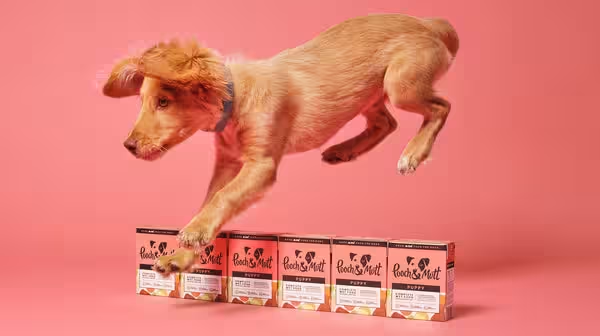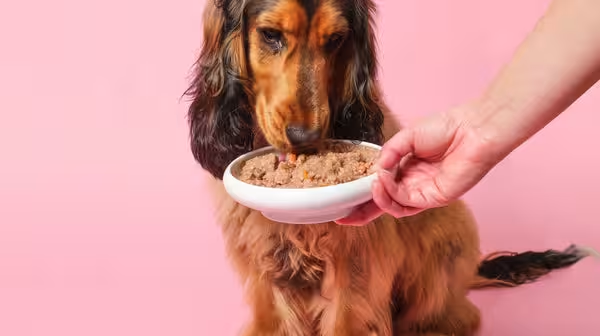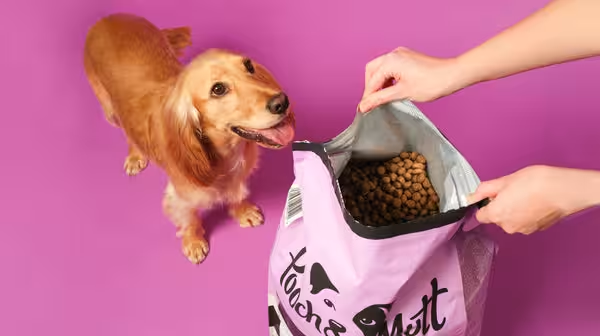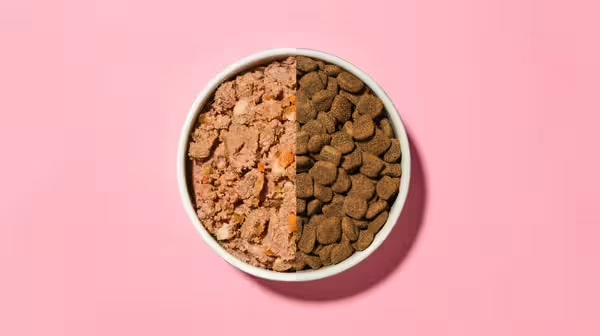There often isn't much of a difference between wet and dry food in terms of nutritional content, especially when you choose high-quality food. This makes the answer to which is the best option for dogs, not a straightforward one. There are variations between the two, so it all comes down to what works best for your particular pooch.
It’s definitely worth consideration, and as the pros and cons of wet and dry dog food are relatively balanced it can be hard to know which one is best for your pooch. Read on as we lay out the differences between wet and dry dog food to help you decide on your dog’s daily menu.
When is wet or dry food better for dogs?
As you can likely gather, whether to choose wet or dry dog food for your dog is largely a personal choice based on convenience and lifestyle, but it also depends on your dog’s feeding habits or health conditions. If your dog is a fussy eater, who often turns their nose up at a meal lacking in taste, you may be more successful getting them to eat a flavour-intensive, natural wet dog food .
Should your pooch have sensitive teeth, or if they’re an older dog who could benefit from the moisture content, they may also get more from a hydrating diet of wet food. If your dog is a grazer, however, who likes to return to their bowl frequently throughout the day, dry dog food could be more their cup of tea.

What's better for puppies: Wet or dry food?
When it comes to puppies , the question of whether wet food or dry food is better is a little more straightforward!
For young puppies, especially with developing or baby teeth, portioned, wet puppy food is often preferred. Not only is it easier on their teeth, but since it’s so soft, it also helps them along with the transition from mum’s milk to more solid food. That’s why, if you do opt to feed them dry food when they’re home with you (which is completely fine to do!), you’re advised to soften it with hot water.
Once they gain all their adult teeth, they’ll be able to crunch down onto dry food without it being softened, and you can then choose to continue them on either wet, dry or a mixture, as they reach adulthood.
What is wet dog food?
As you may have guessed, wet dog food is the softer stuff...- the chunks of meat often drenched in gravy or jelly. By definition, wet dog food is a lot wetter than dry dog food, too - it contains up to 84% moisture, in fact - and therefore needs to be eaten sooner after opening to stay tasty and fresh.
What is dry dog food?
At the other end of the scale is dry dog food, which, in comparison to wet food only contains 3-12% water. Dry dog food is often called ‘dog biscuits’ in the UK, or ‘kibble’ in the USA - and comes in the form of small, brown pellets usually sold in larger sacks or containers than wet food. Generally it lasts a lot longer, especially when stored correctly.

Benefits of wet dog food
First, let’s unload the benefits of wet dog food…
More appetising. We’re sure you’d agree that if you were a dog, you’d probably prefer food that smells and tastes nicer and provides varying textures in the mouth. Indeed, wet food is probably more exciting to your dog's palate than dry food. Dogs aren’t quite as choosy as humans, though - so don’t worry if your pooch has a diet of primarily dry dog food as they’ll be perfectly satisfied.
Easier to chew. Soft, meaty chunks are much easier to munch on than solid pellets, so if your dog has sensitive or small teeth, wet food could be a winner. What’s more, it can also be easier for those with dental disease to manage. If your dog is scheduled for a dental procedure or has just had one, wet food is a good option to ensure they are still getting all of the calories and nutrients they need
Keeps dogs fuller for longer. Wet food with a lot of moisture is naturally more satiating than dry food, so you’ll have a fuller dog who needs to be fed at a lower frequency.
It’s protein-rich. Wet foods often contain more protein-rich meat, which can be beneficial for those dogs that are very active and need plenty of protein to maintain their lean muscle mass.
Better for sensitive stomachs. Dogs with sensitive stomachs and those prone to constipation often do better on wet food diets made from all-natural ingredients. Opt for a specially formulated sensitive stomach dog food or one enriched with prebiotics and/or probiotics when possible.
Disadvantages of wet dog food
Now onto the downers of wet dog food…
It’s messier and smellier. Not to the dog - but to us, the human parents. Wet meat chunks are more likely to cling to your dog’s fur beard as they eat, splay about their feeding area and stick fast to their dog bowl when it comes to washing up. Plus, the stronger smell can seem unpleasant to our human noses.
Shorter shelf life. Once opened, wet food needs to be eaten quickly - within a few days to still remain appetising to your pooch.
Harder to portion. Wet food tends to come in small pouches or cans, so the portioning is almost decided for you. If you have specific requirements for how much you feed your dog, this can be tricky to work out.
More expensive. Wet food is generally pricier than dry food for dogs.

Benefits of dry food for dogs
So what about the perks of dry dog food? Here are some of the reasons to choose dry food for your dog…
Easy to manage. The pellet quality of dry dog food makes it easy to sweep, pour, clean and divide into portions, as it tends to come in sacks which you can swiftly scoop your desired amount from.
Longer-lasting. Dry dog food has a longer shelf life than wet food for dogs. The sack or container must be kept sealed for freshness, but other than that, it can stay good and palatable for weeks on end.
More economic. As it’s long-lasting and easy to portion out, dry dog food is often seen as the more economic choice for dog owners as it costs less over time.
Better for weight loss. If your pooch is on a plan to lose those pounds, dog biscuits are better for weight loss than wet food. Again, this is largely because of easier portion control.
Cleans teeth. Sure, wet food is softer on sensitive their teeth, and there are some claims that dry food can get stuck. On the whole, though, dry dog food has a munchy quality that is beneficial to dental health in dogs and even helps keep their teeth clean. Since kibble doesn’t cake on teeth like wet food can, there is less plaque build-up and lower risk of gingivitis. This is especially important for those breeds prone to dental disease such as Greyhounds, Poodles and Chihuahuas.
Cleaner for dog beards. For longer-coat breeds and those with moustaches and beards (Schnauzers, we’re looking at you!), dry dog food can help to keep fur clean and help prevent skin disease around the mouth.
Disadvantages of dry dog food
Now onto the reasons why dry dog food might not be for you…
Not as sensory. Dry dog food is nutrient-dense, and in terms of taste, is perfectly satisfying to dogs. It has to be said though, dry dog pellets can be a less exciting option when it comes to your pooch’s overall eating experience.
In many cases, more likely to contain preservatives. A pellet is more of a processed format than wet food in many cases, and is therefore more inclined to contain preservatives. This isn’t true of Pooch & Mutt’s organic dry dog food however, which contains all natural ingredients and no additives.
Doesn’t provide moisture or hydration. For a dog who exercises a lot but forgets to drink, a poorly dog or an old dog, a wet food with more water content could be a better option than dry food.
Tougher on teeth. Dry dog food is great for dog dental health, but it can be tougher to chew on for dogs with sensitive teeth.

Mixing wet and dry dog food
“Do I have to choose between wet and dry dog food?” we hear you cry , and we get it! We like to have the best of both worlds, too.
Of course, there are times when you can feed a dog dry dog food when they usually eat wet, or wet dog food when they usually eat dry. It’s advisable not to change frequently between wet and dry foods, as this can be too much for a dog’s stomach to handle.
Many pet parents do end up feeding both wet and dry dog food though. This may mean some kibble left down throughout the day and a wet meal in the evening, or perhaps offering a bowl that contains both. Many appreciate this compromise (owner and dog alike), and most pooches do well on mixed diets.
Remember that we don’t have to choose either wet or dry and stick to it. Your dog’s preference may change as they mature, so keep an open mind. When transitioning diets, ensure to do so slowly over 5-10 days to ensure the change is well tolerated.
Ultimately, the decision is yours
In conclusion, don’t fret about one type of dog food being healthier or better for your dog than the other - if you choose the right food, they will be getting all the nutrition they need! But by considering the points above, you can ensure your dog has a solid mealtime routine and digests their food comfortably and easily.
Pooch & Mutt’s wet dog food and dry dog food are both great options for dogs. They contain nutrients, vitamins and minerals and tasty, all-natural ingredients for daily nutrition that will benefit your dog inside and out. Check out our range of nutritious wet dog foods and dry dog foods, or get in touch for more information.




